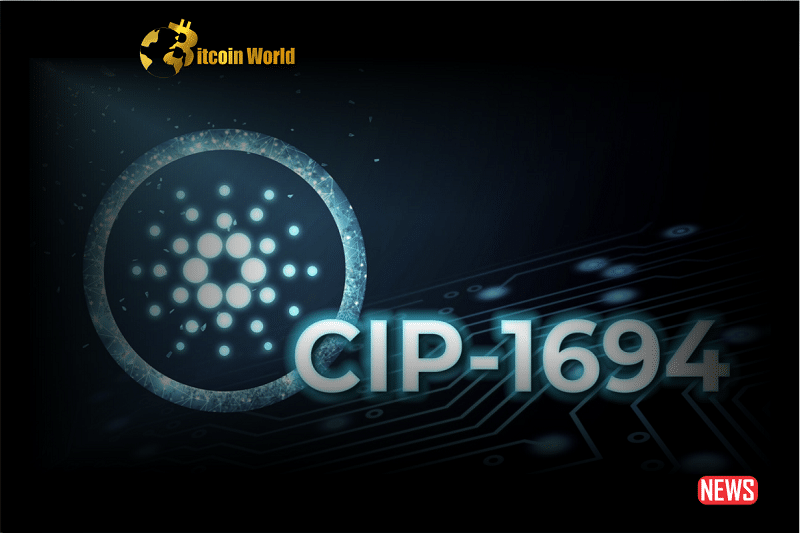Get ready, Cardano community! The highly anticipated Voltaire era is fast approaching, marking a pivotal moment for this leading blockchain platform. Imagine a blockchain entirely governed by its community – that’s the vision, and CIP-1694 is the key. This crucial proposal aims to hand over the reins, empowering ADA holders like never before. But how do you ensure a smooth transition and prevent potential hiccups? Enter the intriguing ‘KtorZ tax,’ a solution designed to incentivize participation and safeguard the future of Cardano’s governance.
What’s the Big Deal with Cardano’s Decentralized Governance?
Think of it this way: instead of a central authority making all the decisions, the Cardano community itself will steer the ship. CIP-1694 is the blueprint for this exciting new chapter, aiming to make Cardano the first truly decentralized blockchain protocol where the community calls the shots. The upcoming vote on CIP-1694 is a big deal, and Cardano is pulling out all the stops to highlight the benefits of embracing this decentralized future.
The Challenge: How Do You Govern a Decentralized World?
Opening up on-chain governance to everyone is fantastic in theory, but it also opens the door to potential challenges. Imagine a flood of irrelevant or even malicious proposals clogging the system. That’s where the potential for manipulation and spam comes in. To address these concerns head-on, Matthias “KtorZ” Benkort, the Cardano Foundation’s technical director, has proposed an innovative solution: the governance action fee, often referred to as the ‘KtorZ tax.’ Let’s dive into how this works.
The ‘KtorZ Tax’: A Fee for a Reason
So, what exactly is this ‘KtorZ tax’? It’s essentially an optional, minimum fee that users would pay when submitting governance actions. Think of it like a small deposit to show you’re serious. Here’s the breakdown:
- Filtering Spam: The fee acts as a barrier to entry for frivolous or spam proposals, ensuring that only genuine and well-thought-out ideas make it to the voting stage.
- Demonstrating Support: By paying the fee, users signal their commitment to their proposal.
- Rewarding Participation: Here’s the interesting part – the collected fees wouldn’t just disappear. Instead, they would be distributed proportionally among all participants based on their stake, regardless of how they voted. This creates an incentive to participate actively in governance.
Why is This Governance Fee a Good Idea?
The proposed governance action fee offers a compelling set of advantages for Cardano’s on-chain governance:
- Enhanced Security and Transparency: By reducing spam and ensuring genuine proposals, the system becomes more secure and transparent.
- Incentivized Participation: The fee distribution mechanism encourages more ADA holders to actively engage in the governance process.
- Empowering ADA Holders: Users gain more control over shaping the incentives for those who represent them in voting.
- Combating Spam: A simple yet effective way to keep the governance system clean and focused.
- Fostering an Active Community: Encourages a more engaged and inclusive governance ecosystem.
Creating a Dynamic Fee Market
Imagine a marketplace where the value of governance actions is reflected in the fees. This is the concept behind the fee market. Users will naturally prioritize submitting actions they believe have the most significant impact, creating a more efficient and focused governance process. Furthermore, Decentralized Representatives (DReps) will be incentivized to allocate their time and resources to proposals that are deemed more valuable by the community, leading to a more diligent and effective performance of their duties.
Can Cardano Really Become More Decentralized Than Bitcoin and Ethereum?
Cardano’s founder, Charles Hoskinson, certainly thinks so! He believes that once CIP-1694 is fully implemented, potentially by summer 2023, Cardano has a real shot at surpassing even the giants like Bitcoin and Ethereum in terms of decentralization. This bold statement reflects the confidence in Cardano’s progress and the transformative potential of its community-driven governance model. It’s an ambitious goal, but with the community’s active participation and innovative solutions like the ‘KtorZ tax,’ it’s definitely within reach.
The Road Ahead: What Does This Mean for You?
Cardano’s journey towards the Voltaire era is an exciting one, and CIP-1694 is a crucial step. The introduction of the governance action fee is a strategic move to secure support for this pivotal proposal and address the inherent challenges of on-chain governance. By incentivizing genuine contributions and filtering out noise, this fee aims to cultivate a vibrant and inclusive governance ecosystem. As Cardano approaches its final stage, the promise of true decentralized governance is becoming a reality, potentially reshaping the entire blockchain landscape. Keep an eye on the upcoming vote – your participation could help shape the future of Cardano!
Disclaimer: The information provided is not trading advice, Bitcoinworld.co.in holds no liability for any investments made based on the information provided on this page. We strongly recommend independent research and/or consultation with a qualified professional before making any investment decisions.


